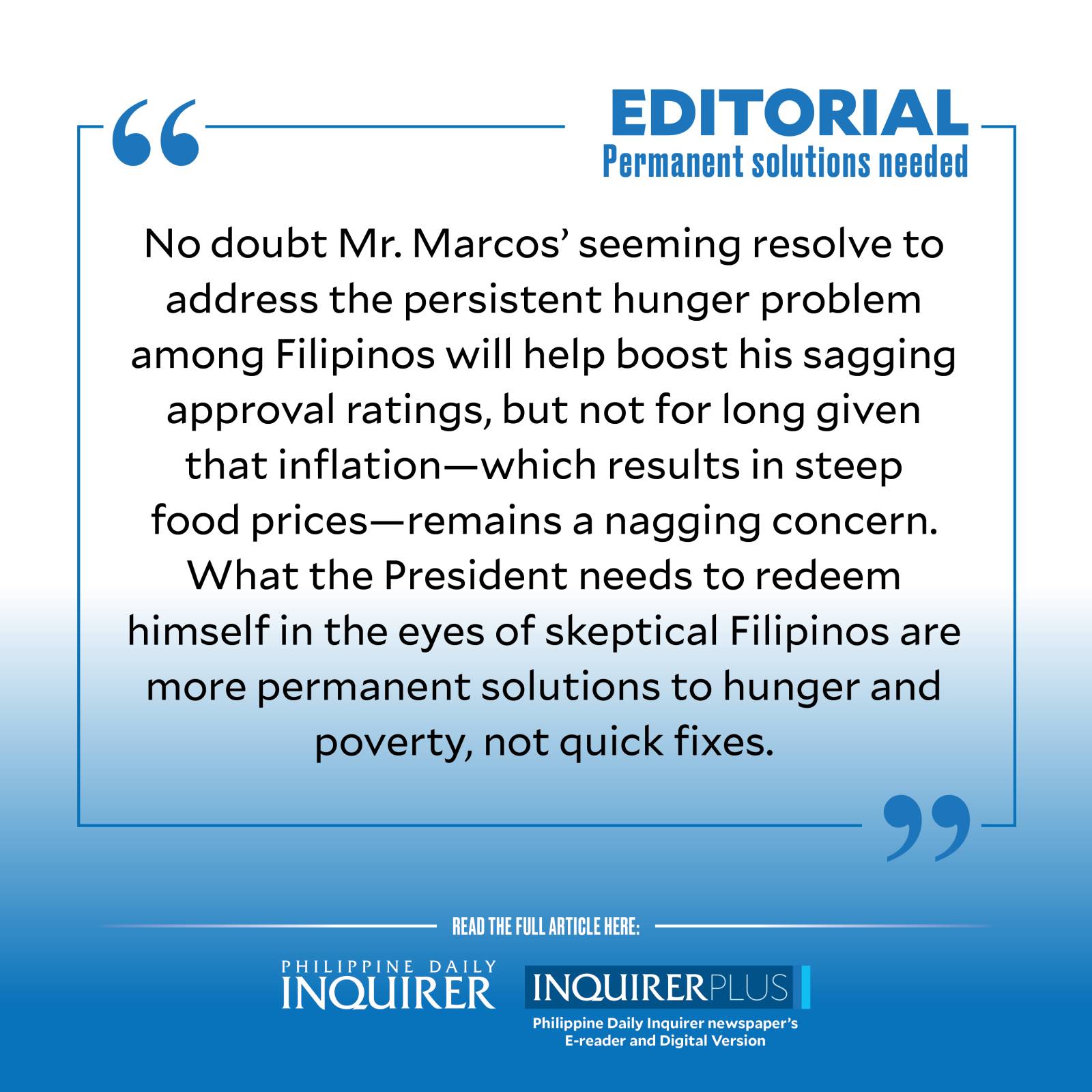Permanent solutions needed

The Marcos administration’s efforts to hit its ambitious goal to end hunger, achieve food security, and improve nutrition got a significant shot in the arm last week when Malacañang issued an executive order establishing a food stamp initiative as a national flagship program.
Executive Order No. 44 or the “Walang Gutom 2027: Food Stamp Program” gave the Department of Social Welfare and Development (DSWD) the mandate as lead implementing agency to secure the staff, budget, and cooperation needed to implement it. Launched on July 18 in Tondo, Manila, and followed by a rollout in Siargao Island in September, the program partly funded by the Asian Development Bank aims to fight hunger by providing P3,000 a month in food credits to one million poorest households, or those with a monthly income of less than P8,000. Included as beneficiaries are pregnant women and nursing mothers.
The electronic credits can be used to purchase selected food commodities from DSWD-accredited local retailers, with half of the amount allocated for carbohydrate-rich food, 30 percent for protein, and 20 percent for fruits and vegetables. The specific food allocation is seen to provide beneficiaries the calories and nutrients they need to become more productive.
Under the EO, the DSWD has been tasked to identify qualified recipients and ensure that the program’s much-needed benefits would reach them. It seeks to avoid the pitfalls of some government programs where ineligible beneficiaries use their connections to local leaders and politicians to get into the list of intended recipients. To help prevent similar irregularities and hasten the rollout of the food stamp program, local government units, government agencies, as well as the private sector and nongovernment agencies were enjoined to provide “full support to, and cooperation with the DSWD.”
As with any other grand government plans, the success of the food stamp project would depend on its implementation. The DSWD must ensure that the intended beneficiaries are properly identified and would have access to the food items specified in its menu. The DSWD must ensure that the chaos during the distribution of “ayuda” or financial aid during the COVID-19 pandemic will not derail this program.
In his speech during the program launch in Tondo, President Marcos said he wanted to achieve “zero hunger” in the Philippines by the time his presidency ends in 2028. “The problem of hunger and malnutrition still remains. That is why it has become a priority of this government that we will fight poverty … so that one day we can say that we are able to give our people, at the very least, the food that they need to survive,” Mr. Marcos said.
The EO is part of this thrust and is in line with the Philippines’ commitment to realize the United Nations’ Sustainable Development Goal No. 2, that of ending hunger, achieving food security, improving nutrition, and promoting sustainable agriculture by 2030. According to the EO, the food stamp program will also help achieve the objectives of the Philippine Development Plan 2023-2028 launched in January this year, as well as the administration’s 8-Point Socioeconomic Agenda to ensure food security and proper nutrition in the country by providing accessible, safe, and nutritious food for all Filipinos.
That the Marcos administration is pulling out all the stops to ensure the success of the program pilot in such areas as Cagayan Valley, the Bicol region, Caraga region, and Bangsamoro should be lauded and supported especially since more Filipinos are going hungry, no thanks to the rising prices of basic goods and commodities. According to the latest survey of the Social Weather Stations, its June 2023 second quarter study released in August found that 10.4 percent of Filipino families experienced “involuntary hunger” at least once between March and June 2023, an uptick from March 2023’s 9.8 percent.
But while the program is commendable, the government should do more and not content itself with just ensuring the success of this food stamp initiative, which is seen by some sectors as a mere palliative that does not consider the fundamental roots of poverty that causes hunger in the first place. Among the causes of debilitating poverty and pervasive hunger are shrinking lands for agriculture and their low yield, due to skyrocketing prices of farm inputs and the aging demographics of land-tillers. Unless these problems are taken into account and addressed, the government would have to continue coughing up P40 billion a year until 2027 to bankroll this program alone.
No doubt Mr. Marcos’ seeming resolve to address the persistent hunger problem among Filipinos will help boost his approval ratings, but not for long given that inflation—which results in steep food prices—remains a nagging concern. What the President needs to redeem himself in the eyes of skeptical Filipinos are more permanent solutions to hunger and poverty, not quick fixes.
















